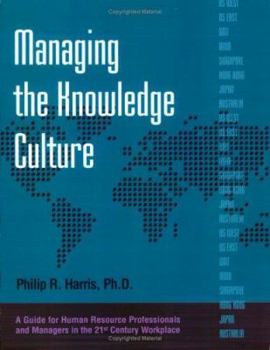Managing the Knowledge Culture: A Guide for Human Resource Professionals and Managers on the 21st Century Workplace
Managing the Knowledge Culture expertly explores how to overcome one of the biggest challenges 21st century leaders and their followers face functioning effectively in a knowledge culture. The... This description may be from another edition of this product.
Format:Paperback
Language:English
ISBN:0874258596
ISBN13:9780874258592
Release Date:May 2005
Publisher:HRD Press
Length:280 Pages
Weight:1.29 lbs.
Dimensions:0.8" x 7.3" x 9.0"
Customer Reviews
2 ratings
An Essential Read for Those Managing Within Today's Knowledge Culture
Published by Thriftbooks.com User , 18 years ago
In this era of the digital economy, successfully managing knowledge and its creators remains imperative. Dr. Phil Harris focuses on this connection between knowledge management and culture in his new book, Managing the Knowledge Culture. The book is divided into two parts, including understanding the knowledge culture and its management, and developing collaborative skills and resources for the knowledge culture. Harris claims that knowledge workers require cultural skills. He writes that information, knowledge, collaboration, innovation, and globalization are the management benchmarks for the digital economy. Harris further opines that organizational leaders operate on several different levels, including strategy, structure, culture, and people. Effective leaders use communication technology and research to facilitate a transition to the knowledge culture. The three "T's" for the new economy are talent, technology, and tolerance. Harris describes globalization as the integration of worldwide cultures, markets, organizations, and people. Information technology assists in spreading globalization. Planned organizational change is necessary to move a system into a knowledge culture. With the rise of virtual teams, Harris touches upon the topic of international meetings. He suggests that such faceless collaborations are improved with well-developed meeting technologies such as using established guidelines, group planning dynamics, conducting and evaluating events, employing technology to involve individuals, and always remembering the human element of making people comfortable and relaxed. Collaborative relationships are significant to team management and development. Managing the Knowledge Culture includes many effective visuals illustrating the salient points of managing in the knowledge culture. Some additional content worthy of note includes how to develop and empower knowledge workers as well as worker migration examples (i.e. India). In terms of building a globalized organization, Harris recommends that global human resources are necessary both inside and outside of organization. Human Resource (HR) systems should focus on enhancing human performance through learning by group organizations and providing members with more opportunities to contribute to achieve organizational goals. The book focuses on the idea of learning organizations that highlights the synergies on how learning can also be effective when it concentrates on practicing successful cross-cultural skills. Peter Senge delved into the learning organization concept and defined it as entities where people continually expand their capacity to create desired results and are continually learning to see the whole together. Mechanisms that facilitate such organizational learning include providing employees with distance learning, mentoring, and coaching. In dealing with learning organizations within a knowledge culture, Harris suggests that leaders need to possess vision, integrity
The Wondrous World of Knowledge
Published by Thriftbooks.com User , 18 years ago
In its prologue reference to earlier 'industrial age' knowledge, the book can encourage the historical-inclined reader to reflect, for example, about the handling of knowledge in the Sumerian era of antiquity. In that early age, the very dawn of civilization, Sumerian interest was neverthless very manifest in discovery, systematic gathering, analysis and recording of knowledge - and also in the inventing of language of numerolgy and counting systems that supported it. Records were etched in stone, and if etched as a mirror-image, could then be transcribed to quantity printing on clay tablets - for granary inventory. They were therefore up to speed in acquiring and managing of knowledge, within the circumstances of the age. In a more recent age, post the Industrial Revolution, and at the end of the 19th century,occurred an accumulation of disparate areas of knowledge that conjoined to acquire critical mass and to explode, almost overnight and on a world scale, into specific practical projects and expertise - that kept patent offices of the day scrambling to keep pace and that sustained the generation of wealth and standard of living for the following century and beyond. In the present time, the informational and electronic age have now changed knowledge management dramatically and exponentially. Dr Harris's perspective explores the challenge of how to function effectively in the knowledge culture, now, of the 21st century - in a complex, rapidly changing and constantly interacting global world of politics, business and people. The book title, "Managing ther Knowledge Culture" means what it says - that the premise and underpinning of managing knowledge lies in an interlocking triumvirate of Culture, Knowledge and Managing. Timely, then, that the book kicks off with key definitions of these elements. Culture is broadly defined as the unique life style of a particular group of people, at a point in time and place. Culture identity includes communication and language, dress and appearance, food and eating habits, beliefs and attitudes and work habits. Knowledge is defined as a state of 'knowing' (from information, ideas, or understanding gained from experience, observation, or study) and is the sum of what has been perceived, discovered or learned. Knowledge should be transferred to others (through communication networks, webs and other) and have the capacity for effective action. - also to be the prologue for generation of ecomomic power and wealth. Within the general area of Knowledge Management,is defined a new specialization that facilitates and supports processes for creating, sustaining, sharing, and renewing of organizational knowledge for wealth, improved profitability and retaining of position in a competitive marketplace. Plenty of scope in these factors, for lively discussion and insight,furnished in the 8 main chapters of the book, 277 pages of text (no punches pulled!), 77 illustrative exhibits and comprehensive bibliography listings.




